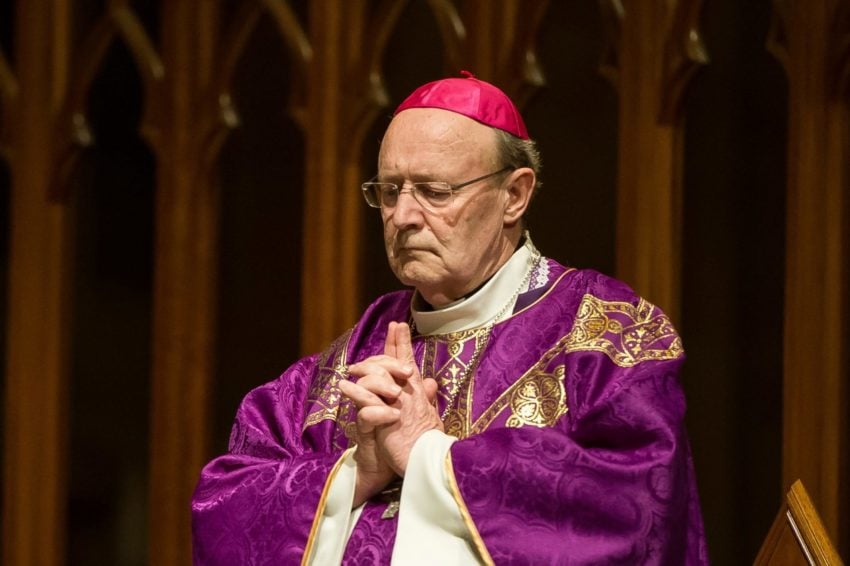
In his feedback to the Plenary Council on its document Towards the Second Assembly, Archbishop Julian Porteous states the conservative position on the reforms proposed by that document.
But underlying the conservative position is an attitude of fear. The primary fear is loss of certainty about the fundamental truths of life and their meaning. Any compromise of the Church’s commitment to those truths threatens that certainty, and must be resisted.
The notion of the “signs of the times” cannot be allowed to be interpreted as anything more than an easy pretext for falling away from adherence to those truths by Church members and the world at large.
Beliefs, ideologies and ways of life that are at variance with those truths can be nothing more than evidence of hostility to them: the powers of this world resisting the saving message proclaimed by the Church. The challenge posed by such resistance is not to revise our understanding of them in an evolving historical, social and cultural context, but simply to find more effective ways of convincing people of their truth.
Secondly, conservatives equate this proclamation of the saving truths, supposedly revealed by Christ, with what the first Christian communities did, and what consequently all Christian communities have done since then. In their view tradition consists of faithful adherence to a set of truths. The experience of unity with a faith community is merely a consequence of this fundamental commitment to the truths supposedly revealed by Christ.
A reductionist view of Tradition?
This is where their legitimate concerns for the Church encounter a stark and fundamental difficulty. This view of tradition is far too reductionist to sustain the notion of a faith community.
What the disciples found in Jesus was an experience of God’s love for them, and their world. What Jesus called them to was to create communities in which this love was expressed in such a way that the same experience was made available to others. The truths were the communities’ consequent – and feeble – attempts at articulating that experience to which the Spirit was leading them. As such, the truths were auxiliary to the sustenance of communities united by the Spirit in the love of Christ.
Commitment to such an uncompromising equation of tradition with a set of truths forces them into a reliance on an understanding of the Church’s authority structure that cannot tolerate threats to it from inconvenient historical facts.
Thus, their rigid distinction between the roles in the Church of laity and ordained, men and women, have to be fixed from its beginning, and remain forever unchangeable, if the theory about how the saving truths are to be known, interpreted and proclaimed is to be preserved.
The late emergence of these authority structures, and contemporary scholarly consensus that Jesus never ordained anybody, pose one challenge to their position. Similarly, the evidence that women seemed to have exercised similar roles to men in the early Church has to be met with a priori denials on their part.
J.A. Dick recently reminded us that scholars now doubt that Peter was ever the bishop of Rome, even though he at some time resided – and also died – there:
“Most contemporary biblical scholars are in agreement with the Catholic scholars Raymond Brown (1928 – 1998) and John P. Meier that the Apostle Peter was never a bishop of Rome. Rome did not have a single supervisor-overseer (bishop) in Peter’s lifetime. When Peter arrived in Rome in the late 50s, Roman Christianity was already constituted with a number of communities with close ties to James and the Jerusalem Community. The much later Catholic assertion that Peter was the “first pope” is, frankly, the result of medieval historical conjecture.”
This is not to suggest that Peter did not have a position of unique authority in the Church, only that the emerging historical evidence does not support the account of that history necessary to sustain the conservative claims for an original fixed and unchangeable structure of the Church.

Conditional mercy
Pastorally, the conservative view is merciless. Forgiveness and mercy are conditional upon conversion to the truths the Church proclaims, and the moral norms it lays down.
The unconditional love proclaimed, according to the gospels, by Jesus, is converted by human authority into a love conditional upon submission to that authority’s teachings and norms.
Nor can it be justly argued that each of these paradigms of Church deserves to be treated as an equal contender for the faithful’s reception.
The conservative paradigm flies in the face of the mandate permeating the whole of Vatican II, and stated explicitly in Gaudium et Spes 5, for “new analyses and syntheses” to meet the problems of an era characterised by “a concept of reality” that is “more dynamic, and evolutionary”.
The conservative paradigm is thus more justly characterisable as a resistance both to the mandate of Vatican II, and to the recognition of the signs of the times necessary to bring our Church back on mission.
This conflict makes demands on the faith of adherents to each side. Conservatives are challenged to place their trust in a God who leads them through history by guiding them to the development of new understandings, and ways of bearing witness to their faith in the light of the signs of the times. This will cost them the pain of letting go the absolute certainty they seek in their favoured set of truths.
Prophets of doom
The defenders of the mandate of Vatican II need to find a way of trusting the guiding presence of the Spirit in what seems a messy and half-hearted attempt at discerning that guidance in “Towards the Second Assembly”.
Our fervent prayer then is that the conservatives are right in prophesying doom to the Church they want to preserve, and that we may be justly convicted of a lack of faith for doubting the capacity of the [Plenary Council] to inflict that doom.
In our assessments of the claims of the past on our planning for the future, we would all do well to heed the message of Pope Francis in his Easter Vigil Homily at St Peters Basilica on April 16th 2022:
“We cannot celebrate Easter if we continue to be dead; if we remain prisoners of the past; if in our lives we lack the courage to let ourselves be forgiven by God who forgives everything, the courage to change, to break with the works of evil, to decide for Jesus and his love. If we continue to reduce faith to a talisman, making God a lovely memory from times past, instead of encountering him today as the living God who desires to change us and to change our world.
“A Christianity that seeks the Lord among the ruins of the past and encloses him in the tomb of habit is a Christianity without Easter. Yet the Lord is risen!
“Let us not tarry among the tombs, but run to find him, the Living One! Nor may we be afraid to seek him also in the faces of our brothers and sisters, in the stories of those who hope and dream, in the pain of those who suffer: God is there!”
Dr. Michael Leahy is a member of Catholics for Renewal and a former Melbourne priest who holds an STL (Rome), and PhDs in educational and political philosophy.
